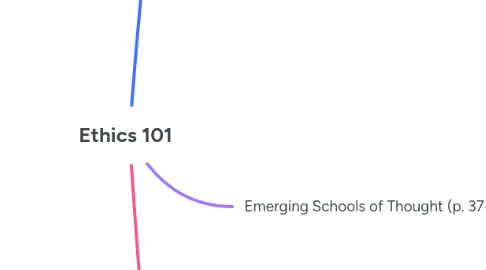
1. Ancient Philosophers (p. 11-36)
1.1. Base Knowledge (p. 11-24) (UNFIN)
1.1.1. Types of Philosophy
1.1.1.1. Metaphysics (The big questions)
1.1.1.2. Epistemology (How we know what we know)
1.1.2. Why act Ethically?
1.1.2.1. Important for learning how society works
1.1.2.2. Good things happen to good people (Is this real?)
1.1.3. Sophistry (Fake Knowledge that Sounds Real)
1.1.3.1. There are many ways to cheat winning debates
1.2. Ethics brings happiness (p. 25-36)
1.2.1. Socrates
1.2.1.1. Question EVERYTHING
1.2.1.2. Humans are inherently ethical, just misguided
1.2.2. Plato
1.2.2.1. We are human because we reason
1.2.2.2. Shaky thoughts (note)
1.2.2.3. We are inherently ethical
1.2.3. Aristotle
1.2.3.1. We are only ethical if we strive to be
2. Emerging Schools of Thought (p. 37-55)
2.1. Cynics
2.1.1. Look to nature for happiness
2.1.2. Diogenes
2.2. Skeptics
2.2.1. Point of view and experience are equal in value
2.2.2. Cannot put our subjective opinions over someone elses. No point
2.3. Epicureans
2.3.1. Minmax happiness and pain
2.3.2. Don't compare to others, what you have now is what you once only wished for
2.4. Stoics
2.4.1. There's happiness in acceptance
2.4.2. What can't be done shouldn't bother
2.5. Neoplatonics
2.5.1. The absence of good is evil
2.5.2. The more seperate from God, the worse off
3. Consequential Ethics (p. 57 - 85)
3.1. Utilitarianism
3.1.1. Base description
3.1.1.1. Minmax pleasure/pain
3.1.1.2. But very subjective what max happiness for most people.
3.1.2. How to calculate?
3.1.2.1. Algorithm determining maximum happiness
3.1.2.2. Some say cannot be calculated
3.1.2.2.1. Should equally consider outcomes, and base off of that. Net gain.
3.2. Ethical Altruism
3.2.1. Happiness comes at the detriment of the agent
3.2.2. Criticisms
3.2.2.1. How can you help others if you are not happy yourself?
3.3. Normative ethics
3.3.1. Objectively right or wrong
3.3.2. High-level etiquette
3.4. Descriptive Ethics
3.4.1. Also known as Applied Ethics.
